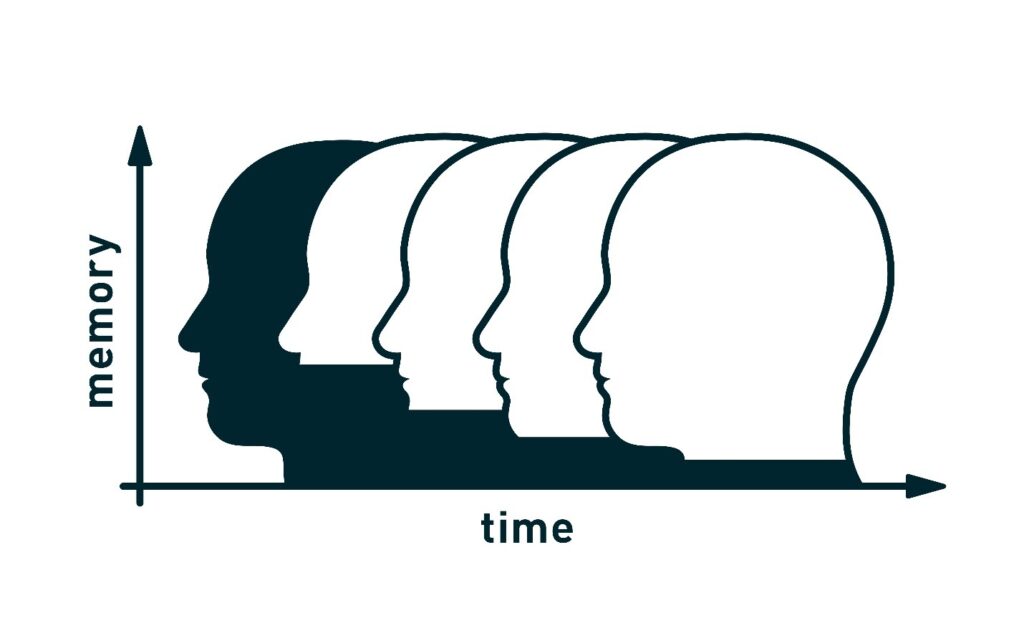If you’ve stumbled upon this blog post, I can assume you love learning as much as I do; and you want that learning to be sticky! Let me share a few strategies I’ve learned as an education researcher that can make learning more efficient and help you—or others—retain information better.
Space Out Reviews
Optimally, review material an hour, a day, a week, and a month after it is learned. Learners are better able to commit information to memory when they study in spaced (i.e., distributed) intervals rather than all at once in a “massed” interval. Spaced practice involves practicing a given problem type or topic in shorter sessions over an extended period. In contrast, massed practice consists of fewer, longer training sessions.
Key research on this topic comes from Ebbinghaus and the Ebbinghaus Forgetting Curve. Here are a few key points:
- If there are no attempts to retain information after it is learned, it will be largely forgotten.
- Within an hour of learning new material, more than half of it is typically forgotten.
- Within 1-2 days, about 70% of it is forgotten.
Although recalling information right before it is forgotten would be ideal, it is impossible to know exactly when that happens (Kapp & Defelice, 2018). Research-based recommendations include reviewing information three or more times (Wittman, n.d.): about an hour, a day, a week, and a month after learning.

Embrace Active Learning
Rereading material won’t do any harm, but the productive struggle required in actively recalling information leads to better retention. Creating concept maps that visually depict relationships between concepts is one effective way to recall information (Schroeder et al., 2018; Wong et al., 2021). Frequent formative assessments—quizzes/tests for learning—are another effective strategy for promoting retention (Yang et al., 2021).
Interleave and Vary Learning Material
Interleaving involves mixing different kinds of problems or study materials within a single session. Interleaved practice—as opposed to blocked practice, which involves studying one topic thoroughly before moving to another—has been shown to accelerate student learning (Hattie, 2023). Although the greater the time between retrieval events, the greater the chance of retaining information (Dobson, 2013), spaced practice within a lesson is still beneficial (Kapp & Defelice, 2018).
Conclusion
While this is not an exhaustive list of strategies for effective learning, these are important concepts to understand. With the advent of open artificial intelligence, these strategies have never been easier to implement. I encourage learners to leverage technology for everything from creating schedules and reminders to building assessments with interleaved materials. I hope this brief overview of sticky learning taught you something new!
References
Dobson, J. L. (2013). Retrieval practice is an efficient method of enhancing the retention of anatomy and physiology information. Advances in Physiology Education, 37(2), 184-191. https://doi.org/10.1152/advan.00174.2012
Kapp, K., & Defelice, R. (2018). Elephant-sized impact. TD: Talent Development, 72(7), 26-30.
Schroeder, N. L., Nesbit, J. C., Anguiano, C. J., & Adesope, O. O. (2018). Studying and constructing concept maps: A meta-analysis. Educational Psychology Review, 30, 431-455. https://doi.org/10.1007/s10648-017-9403-9
Wittman, J. (n.d.). The forgetting curve. California State University, Stanislaus. https://www.csustan.edu/sites/default/files/groups/Writing%20Program/forgetting_curve.pdf
Wong, R. M. (2021). Collaborative concept mapping–Meta-analysis and empirical study. Washington State University. https://www.proquest.com/openview/ad4a082b034ee46ac74dc3a8057ce6f1/1?pq-origsite=gscholar&cbl=18750&diss=y
Yang, C., Luo, L., Vadillo, M. A., Yu, R., & Shanks, D. R. (2021). Testing (quizzing) boosts classroom learning: A systematic and meta-analytic review. Psychological Bulletin, 147(4), 399–435. https://doi.org/10.1037/bul0000309